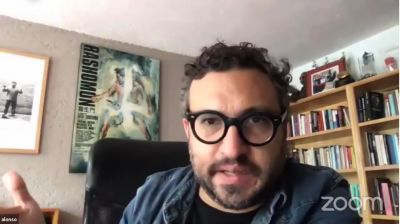Fresh out of drama school and faced with months of unemployment, film director Alonso Ruizpalacios began writing diary entries on his flatmates’ daily activities to pass the time. When one friend likened Ruizpalacios’ writing to their experience during the 1999 student protests in Mexico City, he started to investigate further.

Ruizpalacios said what started as a coping mechanism transformed into a screenplay about people’s lives in limbo. That screenplay became the 2014 film “Güeros.”
“When I decided to make this occupational therapy into a serious screenplay, and then I decided to go and revisit the strike, then it all started coming together,” Ruizpalacios said, “then I knew I was making a film about idleness.”
Although COVID-19-related complications prevented Ruizpalacios from speaking with Boston University students last March, BU’s Center for Latin American Studies hosted the “New Voices in Mexican Cinema” event on Thursday, inviting Ruizpalacios to virtually chat about his work in the film industry.
Adela Pineda, director of Latin American Studies, said after the discussion that she invited Ruizpalacios to discuss his film and its connection to broader societal concepts.
“The idea in bringing a filmmaker is to speak his craft,” Pineda said, “to see how filmmaking is an activity that is very concrete, that deals with human beings, that deals with relationships and it deals with these very universal themes that touch all of us, like friendship, like disappointment, like strikes.”
Ruizpalacios began the event by sharing the lengthy process of writing “Güeros,” his debut film, about a young troublesome boy named Tomás who is sent to live with his brother in Mexico City.
Ruizpalacios said he did not return to his original draft of “Güeros” until six or seven years after writing it, and that the inaction he felt during the tumultuous time in which he wrote it was too overwhelming. When he revisited the screenplay in a better state, he felt as though a large part of himself was encapsulated in the film’s production.
“They say that a director’s first movie takes all of his life from birth to however old he is when he starts to shoot it to make,” Ruizpalacios said. “Whereas, your second movie only takes … two years or three years.”
Jonathon Lazeroff, a senior in the College of Arts and Sciences, said Ruizpalacios’ description of his work hit a personal note, as Lazeroff is currently writing a script for a musical.
“This is a part of our class and our curriculum, so it’s been very interesting to see how it relates to the course and it’s a very cool thing to be able to do,” Lazeroff said after the event. “So from an inspiration point of view, it was really interesting to hear where he was coming from.”
Aside from exploring idleness, Ruizpalacios said his love for his hometown in Mexico City helped shape “Güeros” — his depiction of the city was heavily inspired by “Citámbulos Mexico City,” a book that invites readers to travel around the pedestrian-hostile area on foot. He said he enlisted the help of the novel’s authors to guide viewers around the city’s peculiarities, which helped him add perspective and movement to the film.
Although “Güeros” combines two essential elements of Ruizpalacios’ life, he said the one thing that ties all the strands of the film together is friendship.
“There’s something about those formative years and the friendships that you form there that you never seem to find after, with that much power and honesty,” Ruizpalacios said. “The only sort of redemption that these kids find is in their friendship and each other.”
Zack Abdu-Glass, a graduate student in Wheelock College of Education and Human Development, said the event provided insight into how Ruizpalacios uses Mexican and personal history to tell a story.
“I think it was a really interesting look behind the curtain,” Abdu-Glass said. “Seeing how he uses his own experiences along with the history and the tradition to make a really powerful story was really revealing.”














